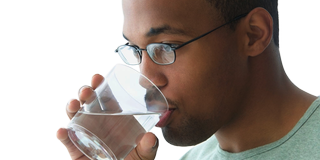Essential benefits of drinking water

What you need to know:
Hydration. To function optimally, your body requires enough water. Therefore, staying hydrated is one of the most important things you can do to stay healthy.
It is a no brainer that water literally sustains life. To highlight the importance of good hydration, Dr Moses Arinaitwe, a general physician, explains how the water in your body is used.
“Water keeps us hydrated. This means that all your enzymes and body reactions depend on water. For example, the food we eat requires water to be broken down (digested) into the form that our bodies can use. For instance, the breaking down of carbohydrates into glucose that can be absorbed into the body requires water,” he explains.
Additionally, the doctor says, transportation of various nutrients in the body requires water because many of these are transported in solution form. In addition to these are waste products such as urine, stool and sweat, which are also taken out of the body in a solution form.
“Also, the body needs water for growth and formation of new cells.
Some parts of the body are made up of water that is under pressure. For example, to maintain the shape of your eye, you need a gel, and one of the components in it is water,” Arinaitwe says.
How much water?
In one way or another, we all drink some amount of water, but how much water does one need to drink to ably sustain their body and is there such a thing as too much water? Felista Nakasiita, a nutritionist, says one should take at least eight glasses of water per day (roughly two litres) .
“Ideally, this means 11.5 glasses (2.7 litres) a day for women and 15.5 glasses (3.7 litres) a day for men,” she says, adding that an adult should take at least three to four litres of water daily.
“One should take 150mls per kilogramme per day, depending on one’s weight. In simple terms, for the first 10kgs one weighs, one litre (1000mls) should be taken, for the next 10kgs, half a litre (500mls) and then multiply by 25mls (quarter a litre) for the remaining kilogrammes. The total will give you the amount of water you should take per day,” the doctor elaborates.
Regina Nantege, a dietitian, says proper hydration is 35mls of fluids per kg of body weight.
Too much?
Although the body naturally has a way of eliminating excess water, Doctor Arinaitwe explains that in the process of ridding the body of the excess water, body salts, which are needed in the body are also lost.
“Exceptions are when one drinks distilled water which does not have electrolytes or sea water which is hypertonic (has more salts than the body). In the process of eliminating the salts, a lot of water in the body can be lost, causing dehydration. The other exception is if a health worker gives someone too much water directly into the veins (IV). This is problematic since the water can collect in the lungs and cause difficulty in breathing. It could also lead to swelling of the brain, although this is rare,” he elaborates.
Nantege adds that there can be fluid restrictions for people with certain disease conditions such as kidney disease and heart failure. The limit in this case is set by a health expert.
When is the right time?
Whereas water can be taken at any given time of the day, Nakasiita says it is good to start the day with a glass of water to help the body flush out toxins. She adds that it is also recommended that one drinks water before meals. By doing this, one feels full and thus, consumes reasonable amounts of food.
“This practice is good, especially for those who want to lose weight. It is, however, best to drink water throughout the day and avoid drinking water at night as the frequent need to urinate will interrupt one’s sleeping cycle,” says Nakasiita.
Spicing it up
A number of people detest taking plain water. In fact, five out of 12 people we randomly asked about the issue said they found plain water ‘boring’ to drink. So, what are some of the healthy ways to spice up your water and still enjoy its benefits?
Maurice Mangeni, a nutritionist, says herbs, spices and fruit slices are a good place to begin. He mentions lemon, orange, tangerine slices, strawberry slices, cucumber slices, beetroot slices and hibiscus, among others as some of the flavours one can go for. Spices such as mint leaves, rosemary, oregano, basil, ginger, cinnamon and cloves, among others are also reccomended.
Traditionally, some people store their drinking water in smoked pots to add a nice smoky aroma to it.
Tips to Increase daily fluids
According to livestrong.com, if you are on the low end of fluid intake most days of the week, a few tips to help you meet your daily quota might be exactly what you need:
• Dilute fruit juice with water by combining three to four ounces of 100 per cent fruit juice with two to three ounces of water.
• Eat foods high in water including broth, soup, watermelon, tomatoes, cantaloupe, celery, spinach, peppers, cucumbers, strawberries and zucchini.
• Drink one glass of water before each meal.
• Fill a water bottle with 18 to 20 ounces of water and add four ounces of 100 per cent cranberry juice. Sip throughout the day.
• Make ice cubes with fruit-infused water. Then, add to a water bottle with plain water.




